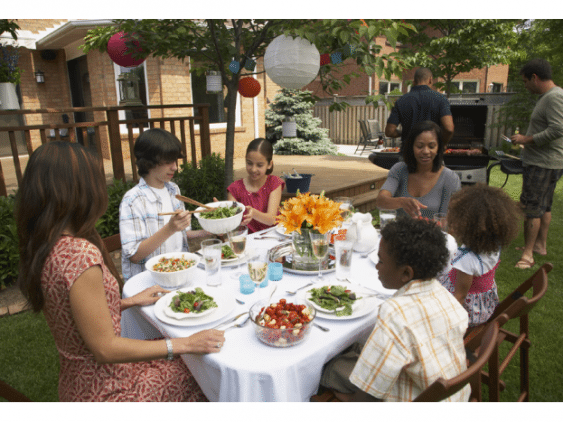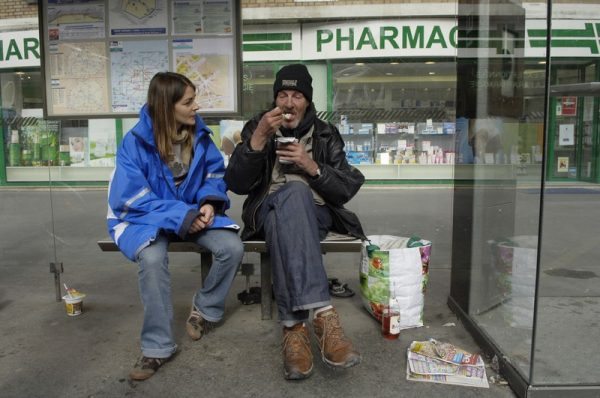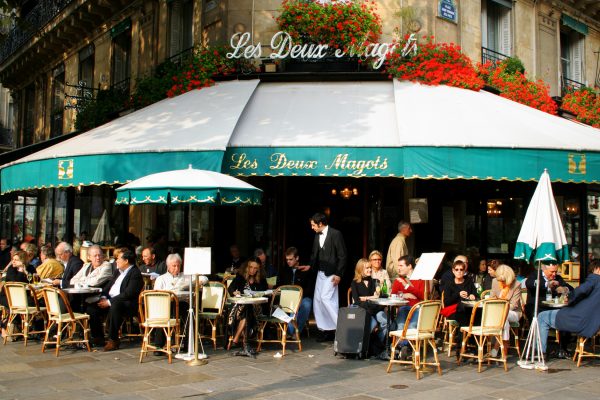Reading Time: 6 minutes.
There are some weird things about the French that the rest of the world will find a bit hard to understand.
It is true that there are also a lot of prejudices against the French that have resulted into some made up observations about them. However, even if you set aside such prejudices, it will still be obvious that the French sometimes act and do some stuff in a strange way that is unique to their culture.
While it can be argued that our opinion of weirdness is influenced by our own culture, the following French customs and habits may be viewed by the rest of the world as just being a bit off. You know, one of those typical French things.

1. All about Bread

Source: nyhabitat.com
The French really love their baguette and they will be the first ones to admit to it. They love it so much that at the end of the work day, you’ll often see them walking home with one or two baguettes, and with small portions already eaten from one end.
Eating the bread is also another thing. You don’t stuff the bread into your mouth and bite off a piece. The French way to do it would be to tear a bite-sized piece to eat and repeat the process until you are done. The French also serve bread on the table most of the time and not on the plate.
Speaking of plates, when you happen to be dining on a dish with a delectable sauce, it is customary for the French to wipe the sauce off the plate with a piece of bread then eat it to cap off your meal.
2. Little Gourmands

Source: ivillage.ca
It is normal for kids in United States and a great deal of other countries in the world to regularly eat burgers, hotdogs, chicken fingers, and fries. In France however, it is more commonplace to see children eating ‘adult’ food.
The lucky children in this country get introduced to an assortment of food which helps them appreciate a good meal at an early age. Their young taste buds are exposed to a variety of flavors. This is perhaps why French cuisine evolved into what it is today—one of the world’s most well-loved fares. This is not weird at all, if you come to think of it. You can either follow their lead or hate them for being such gastronomic snobs.
3. Chivalry is a Way of Life

Source: amberschristiangirltalk.wordpress.com (but please don't smoke)
Picture this: a woman is about to step out of a café and a man she doesn’t even know helps her put on her coat and holds the door open for her.
In the US, the girl will interpret this gesture as a sign of flirting 9 times out of 10, or worse, the guy might even be called a sexist and will be in for a good dressing down. Back in France however, this is not considered as sexism but as just typical French galantrie.
Americans and Americanized women should take heed that when in France, it will be considered rude to refuse such forms of courtesy from a French gentleman. This is yet again another of those typical French things that some cultures can take a cue from.
4. Kiss Me Quick

Source: leparisien.fr
This is a custom that is still related somewhat to the previous entry. The French kiss each other on the cheek as a form of greeting. The double kiss greeting on both cheeks goes for two women, women and men, and even for two men, especially for the older generation.
In some regions in France, they even kiss each other as much as five times. While this greeting is customary in France, it isn’t exactly the type of greeting that will fly around anywhere. It may interest you to know though, that greeting someone in such a way will be illegal in the country if you do it on a railway, as it is illegal to smooch on railways in France.
5. Communal Solidarity

Source: Samusocial
It isn’t uncommon to see complete French strangers help each other out even in the simple tasks. To illustrate, a totally random person can help hold the arm of a blind person and help him or her cross the street, or help an old lady carry bags of groceries for her.
While some other cultures are also like the French in this regard, there are some cultures that would rather not touch you or even offer you help for fear of getting into trouble just in case something bad happens. Literally laying a finger on someone even constitutes assault in some countries.
Still Stuck at Intermediate French?

Break through the plateau with our proven coaching and study method.
5. Negative Vibes

Source: Abcnews
For some reason, the French are negative most of the time. As an example, if you are out to propose a project, expect your French audience to enumerate all the potential risks and problems that your proposal may encounter. Another example is that in case you got an A- in your exam, expect to be asked, “why not A+?,” instead of getting a pat on the back.
The reason behind this is that the French consider being positive to be a bad thing and ignoring the negatives involved is just naïve. One other explanation for the negativity is that the French believe that seeing the defects first is a sign of competence and intelligence. So when dealing with the French, expect to be criticized for it is a good thing, and if you get praised, then that is just weird.
7. Chipping In, Instead of Splitting it

Source: picturesofmoney.org
In the US and other Americanized countries, it is commonplace for groups to split the bill in a restaurant. This is the case even for two people who are out on a date. The typical reasoning behind it is that everyone gets a fair share of the responsibility to pay and no one will end up owing anybody anything.
The French however, look down upon this practice as a sign of miserliness and is therefore, unacceptable. When in the same situation, money is not an object for the French and they will give a share of what they believe is fair, which is usually more than what they would be giving if they were to divide the bill equally.
This can oftentimes prove chaotic as some will end up paying less than the others, which is yet another bad thing for the prestige and image-conscious Frenchmen.
8. No Skittles at the Pharmacy

Source: wikimedia.org
The good news about pharmacies in France is that they're easy to spot as they almost always have green neon crosses right beside their equally large neon signs. If , however, you ran to the pharmacy to grab a candy bar or a mascara that you forgot at home, chances are you’ll be walking away empty handed.
While most countries in the world have followed the concept started by CVS and Walgreens of turning the pharmacy into a mini-Walmart, most pharmacies in France have remained, well just that, pharmacies. These establishments are often owned and operated by families and they sell only the things that you would normally buy from a pharmacy. Those of course---being medicines.
9. Paper or Plastic Bag

Source: Uvahealth.com
This is actually your own choice when you go grocery shopping in France because you have to bag your own groceries. The obvious advantage to this is that you’ll get your groceries arranged and packed just the way you want it. Since no one will bag your groceries for you, don’t expect some staff to help you load them into your car either. Another downside is that if you arrive home with cracked eggs or with cheese that smells strongly of laundry detergent, you only have yourself to blame.
You could consider this to be some form of training in self-reliance. But it is also indicative of the type customer service you're likely to receive in a European grocery store. (Please note that some small local supermarket called supérette offer some free plastic bags. Most supermarkets will ask you to pay to get a reusable plastic bags.)
10. Hour Long Latte

Source: wikimedia
In contrast to other cultures, the French prefer to be deliberate and take their time in some matters. Take an order of a small cup of espresso for example. It is typical to see a Frenchman take several hours to finish this small cup in France. Most people regard espresso as a quick way to get caffeine into their system. French people would rather savor and sip it little by little as they relish their company or the book they're reading.
Admittedly, every culture has its own weirdness that not every other culture will understand. It is this very same quirkiness however, that makes one culture unique and distinctive. The French have their own strange habits, just like any other culture has theirs. The best thing about it is that we all embrace it for all it is worth.
Also please note this is a generalization of our habits. But it does not mean that ALL the French will behave like that (in particular for Galanterie 🙂 )
If you know any weird French habits that I missed, feel free to share it in the comments section.


[…] Culture: 10 Unusual French Habits You Should Know. Reading Time: 6 minutes. […]
Another one I’ve noticed is frowning on eating outside or on the go…which is displayed in disapproving looks or sarcastically saying “bon appétit”! In discussing this with A Parisian friend I found out that this is part of point 10 and the belief that meals should be savoured…which is easy to say if you only work 35 hours a week!
Actually it is common myth about working 35 hours per week. On average is more like 38 hours. Check this article here also: https://www.theguardian.com/news/datablog/2011/dec/08/europe-working-hours
And only for people with non cadre status…
Another one is believing in homeopathy and graphology, despite both of them having been proved to be nonsense!
Yes I agree on these two 🙂
[…] French Weird Habits […]
The handshake is still much in evidence, generally before you get acquainted enough for the kiss kiss stage.
It depends, between a man and a woman you can do the “kiss kiss” stage during an informal event. No need to get acquainted. Between men the handshake still rules.
I loved the reasoning for #6 negativity. I’d like to add, I thought negativity was just the idea that they don’t like change and think things should stay the same forever. Therefore, with any change, there is a huge protest, but I like your reasoning for #6: thinking others are naive to not think beyond the negatives. Interesting!
It is part of our education to be negative. We have to develop “un esprit critique”.
[…] Learn and discover French 10 Unusual habits that may be viewed by the rest of the world as weird. […]
I love love France… Maybe not oddities but my observations…
I would watch the other apartments from my own and like clockwork all dark apartments would light up a 8pm.. Dinner time.
They also close up their shutters promptly every evening at dusk..
I could drink 3 lattes in the time they would drink one!
Around 4 pm everyone is seated at a cafe all facing the sun!
The women can sport heals in any circumstance, walks in parcs, shopping thru cobblestone streets.
They never leave the house without a scarf and dress nicely even if its a short trip
to the boulangerie for their baguette! I have seen people jogging in scarves and doggies sporting them as well!
Everyone is at the market between 7 and 8pm!
The women seem to always wear parfume.
And speaking of dogs….they have the most well trained dedicated to their owner canines I have ever seen!
They are always at the parc with their children after school! Love French children, they are dressed so adorable! Like little adults with leather shoes, little trench coats, hats and as scarf!
Thank you Anni for your observation. I am glad you notice also that French spend a good amount of time drinking/sipping their coffee. Some comments on Facebook try to deny this fact…
…. since few months and I understood why some people can eat so early: they don’t Cook. In France even after a work day we cook. That’s why our children have to eat like adults: home is not a restaurant, they have to eat what is served or they don’t eat. It’s their choice. ..
Hi, Anne,
Did we meet in a boulangerie? It seems like it. All your observations are on point.
I’ve live in London since
[…] Learn and discover French 10 Unusual habits that may be viewed by the rest of the world as weird. […]
[…] and other food that’s only limited for their kiddie taste buds. They are introduced into a variety of food and flavors which help them appreciate the value of a good meal at a young […]
[…] and other food that’s only limited for their kiddie taste buds. They are introduced into a variety of food and flavors which help them appreciate the value of a good meal at a young […]
[…] and other food that’s only limited for their kiddie taste buds. They are introduced into a variety of food and flavors which help them appreciate the value of a good meal at a young […]
I have visited France six times since 2002 and absolutely love the country and culture. They are well-mannered, have great food, kind, and their roads are beautiful, lol, especially compared to Michigan roads.
The bread in France is made differently and taste much better. I cook and bake but I don’t know how they do it, but our local baugette’s do not taste as good. In December of every year in France, the bakeries and markets like Carrefour begins making galette du rois. Because I am cannot find a bakery around Metro Detroit that makes these I have learned to do it myself. It’s easy and everyone loves them.
My most recent trip was this past May. I stayed in Paris and took my two french friend and his wife up to Normandy. A great trip.
I have driven cars myself in France and they are good drivers. There seems to be a rule that is opposite of our “right-of-way” in Michigan. If am coming up on a corner and I have the right-of-way, the guy at the corner has to wait for me to pass. But apparently this is not the case in France. A french dude yelled at me for passing him as he waited on the corner on my right. My french friend confirmed this and said that yes, this is an odd rule compared to what we do in the States.
Oh yeah the driving system is a bit different here. 🙂
I would imagine that the flavor difference between their breads and the American garbage is that they use fresh stone ground whole grain flours that are NOT bleached, brominated or self rising like is commonly used in the USA. Everything there used for cooking and baking is different than USA ingredients – which tend to use a lot of preservatives, texture enhancers, artificial coloring and flavorings. Real bakery goods are not loaded with preservatives. Which is why you only buy what you can eat in one or two days and then you go back and buy more. In some cases, Europeans go to the grocery market once a day and eat what they buy. They don’t have massive refrigerators and freezers stuffed full of food to last a month or more!
It also has to do with the difference between “hard wheat” and “soft wheat.” I can’t remember which is used in which country, but the difference in the flours makes the difference in the bread.
Hi SDW,
Things are getting better here with regard to “priority from the right” which goes back to the days when all road vehicles were horse drawn (pulled by horses). Here in the Tarn et Garonne there are very few of these outdated road junctions as they are very quickly being replaced by a STOP sign with eight sides, meaning the instruction is mandatory.
[…] https://www.talkinfrench.com/french-weird-habits/ […]
We had an exchange student from France stay with us (he’s home now) but I wish I had read this before he came! Especially about the negativity! I thought he was just being difficult! And he couldn’t get over the fast eating here in America. In his American high school he only had 20 minutes to eat lunch, but in France he had like an hour and a half!
Hello,
I’m french (sorry for my english) and I read your article with curiosity about the way people from others countries see us. i’m really enjoying and I find you see very well some of our habits! I find very weird the fact of eating fast in others countries, more than all the fact that children don’t eat the same as adults! I don’t understand why they have to eat fries, hot dog, burgers? (But now I think I understand more the problem of obesity in USA!)And I have a question : how do you say hello without a kiss? by shaking hands? You are totally true about the french négativity I laughed a lot! We are not all the same but to me you’re welcome here, and I would like to visit your country too!
Hi Emi,
In a formal situation or where you’re greeting someone much older than you, a handshake is common. Between friends, though, usually people just wave or say “Hi”. Between good friends (especially women), they usually hug.
I’m Australian + we always say hello with either one or two kisses + we also hug close friends. Meeting for the first time, we shake hands, but there are rules to shaking hands. A woman offers her hand to a man, to shake hands, a man never offers his hand to an woman, it is very bad manners.. An older woman offers her hand to a younger woman, to shake hands – a younger woman never offers her hand to an older woman, it is very bad manners. People the same age + same sex may offer their hand to each other.
No, we really aren’t that formal here in Australia regarding the handshaking. I’ve had women of all ages give a handshake and many who wait for a man to intiate and are happy to receive it when they do. It’s really down to personal preference of the individuals involved.
Hi Frederic,
I just read your article by a friend and found it pretty accurate! I am also French and studying abroad in the US. What you said about food is true, but people need to know that we are not eating “cuisine” as you call it every day, and the american culture about food is also settled in France (adapted for our habits), for instance, a McDonald’s meal will be better in term of quality than yours in America, simply because we don’t have the same rules on food between our two countries.
Also, what I’ve noticed here in America, that waitresses are really present when you are eating, always asking “how is it so far” which could be seen as rude in France because we like eating without being annoyed by others. So that’s why you’ll never see a waitress in France asking you often if all is alright.
Yes, thank you Nicolas for sharing your insight 🙂
I found your article enlightening. I’m wondering if I have inherited some of the French tendendancies? I prefer many of the habits described here.
Hi Frederic,
I love your presentation of “weird” french habits! however, I am quite unsure about your comment on pharmacies. As far as I know, they also sell skin care products, powdered milk, cosmetics, etc. Did you mean that TRADITIONAL french pharmacies only sell medicines, or you consider skin care products as some kind of medicine?
Thanks for all!
Skin Care Products are medicine for me (but not make-up).
I don’t know if you’ve ever been to the southern parts of America, but down here chivalry is very alive and actually expected. It’s considered rude to not hold the door or offer to help someone if they have their hands full. Also talking to strangers is a regular occurance, especially on public transport or in grocery lines.
If you recall your history lessons, that was indeed French territory once-upon-a-time.
Loved the article! Some things I noticed… In France, when you order water it usually doesn’t come with ice. In the US, at restaurants you are almost always provided with a glass of ice water before you order a drink. I did notice one of the comments mentioned mcdonalds being different. I agree! Mcdonalds in France tasted cleaner and not as greasy. It is hard to compare France to all of the US though because in the US even traveling to another side of one state could be a total culture change!
I’ve noticed French don’t offer doggie bags! Why is this?
I also don’t understand why Parisian taxi drivers are so grumpy.
I replied to your questions in the newsletter.
paris la vile de mes réves, viva la FRANCE
Love it and I believe it’s all true
True story, living with my french boyfriend taugh me that no matter how much you eat for dinner they will always have space for a plate full of cheese!
I have been married to a French lady for 24 years. Six of her family just came here for Christmas. I was forcefully reminded of something for me that has always been difficult at holidays: the kitchen and dining room are the center of French socializing with guests at home.
We started with apparatives and everyone stood around in the kitchen and visited and drank for nearly an hour. Meanwhile I’m itching to take my drink to the “salon” and sit in a comfy chair with my drink.
But that was just the beginning: we moved into the dining room for our meal and were there for just above four hour and talked and paused and ate again while talking. In the meantime I am itching to leave the table after only an hour.
I’ve done this for 25 years and still fight the urge to go fast and seek out a comfy chair in front of the tv.
You forgot the nail biting and reading books on the metro that was rampant when I visited 2 years ago. I could not believe that people would bite their nails so voraciously after letting them drift onto surfaces that so many others have touched. Yuck!
Gosh, I have been living in France & Lyon for about 2 years now. What is more i have been exploring the French for some time now here: jadorelyon.com. But I have not discovered all those things you mentioned about. But when i think about it, you are so right. This is so good observations you shared with us. I do appreciate and like very much. I have written other things I have discovered about French on here: https://jadorelyon.com/all-the-truth-about-french/ What do you think about this? Thanks!
Hi Frederic, I began learning French I was 9, have a Masters in French…now I’m 45, still learning! I have a few additions. This one first: In the US everyone knows that we are not as formulaic in our shopping and dining interpersonal transactions as in Europe. The rather impersonal reserve one encounters there is comfortable, if you know the formula, but it’s certainly not the “friendly” feeling we have in the US, which, although it’s often a false friendliness and overly familiar, feels warmer and enables you feel it’s fine if a transaction goes “off script.” The formality and scriptedness can feel uncomfortable in France because one can feel judged if one goes off it. (The dreaded cluck-cluck of the tongue and finger-wave!)
Don’t touch produce at the produce stands. Ask the merchant ( very politely) and the merchant will be the only one handling the produce.
bonjour- when you walk into a store you are greeted and it is impolite not to respond. not a mumbled bonjour but a but with a heart felt bonjour madam.
It is very impolite ( and marks you as a foreigner) not to be polite. It will be very obvious that you are not French but a smile and an attempt to speak french ( even if botched) is appreciated. Google translate is your friend!
Do the French tend to ignore you when you send emails? It seems very common to me as I work for a French company. I think they didn’t get the email but in fact they did if you confront them. I am thinking in retrospect that in USA we have a culture of acknowledgment. Its just weird to get an email and not respond to me. But to the French, people just ghost your messages.
You are absolutely correct! As a French-American, I never realized how true it is. In the U.S., it is a culture of acknowledgement, to our detriment I believe. It feeds into sensitivities and insecurities.
When in France, do as the French do. There is nothing odd about it or strange. They act on natural rhythm. They call a spade , a spade. There is no muss and fuss. They are black and white, have logical thinking. They work with the day and the night, take pride in their routine and rhythm, have a sound social etiquette and act out their lives with method and social belonging. From a English woman in a French family …. non of it is odd…. just elegant, routine, reciprocal and expected. Don’t try to hard, the French love to share their culture when you act outside of it. Also, food …. you indulge… the most marvellous food …. but in increments… and as such never indulge. They appreciate food but do not act with gluttony… pace yourself and appreciate what you eat 🙂